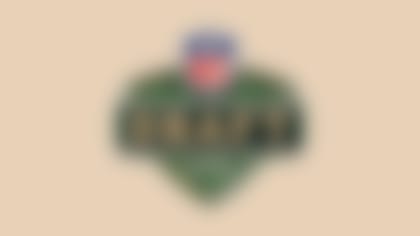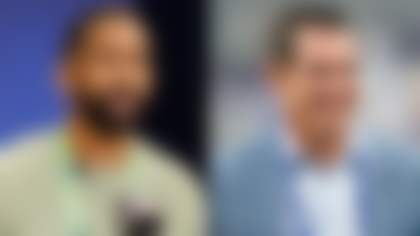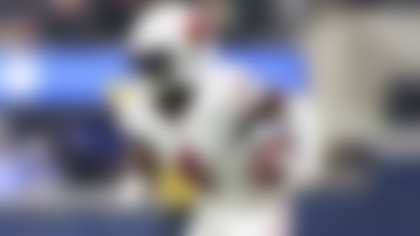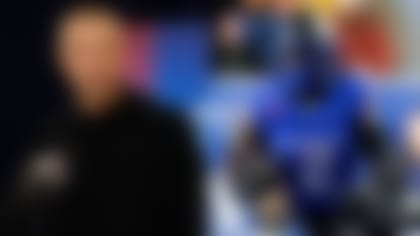The defining moment of Sean Payton's career -- the defining moment of the entire New Orleans Saints franchise, it turned out -- was his call for an onside kick to open the second half of Super Bowl XLIV. The rest is part of NFL lore: New Orleans recovered the kick, upset the Indianapolis Colts and secured the Saints' only championship.
On NFL Network
NFL Replay
will re-air the
New England Patriots' 30-27 win over the
New Orleans Saints from Week 6 on Wednesday, Oct. 16 at 9 p.m. ET.
It was a rare moment of riverboat gambling in a fundamentally risk-averse league, one so daring, even other coaches later admitted they were not sure they would have had the nerve to try it. In a league where coaches sometimes prefer to dodge disaster -- lest they have to explain their outside-the-box thinking to an angry owner on Monday morning -- the success of the onside kick helped stamp Payton with the reputation he sustains to this day, as one of the most creative, aggressive play-callers in the game. It is, combined with Drew Brees' artistry, what makes the Saints so dazzling and so dangerous.
Which makes the final minutes of Sunday's 30-27 loss to the New England Patriots so unexpected.
After clawing back from a 17-7 halftime deficit in Foxborough, the Saints led the Patriots by a single point late in the fourth quarter. And then, against type, they took their foot ever so slightly off the gas to let their machine idle, trying to hold the lead rather than extend it, hoping the clock would tick down fast enough to send Tom Brady to the Gillette Stadium showers before he could rain down ruin on them. The end result: Brady got three shots to win the game with 3 1/2 minutes remaining. You don't have to embrace advanced statistics to know that is almost always too many.
"We were kind of paying attention to the clock, and we were trying to get some yardage and possibly get a first down," Payton said. "We were getting a heavy front with the risk of throwing it and the clock stopping. So we can wrestle with that for a while, but they made the stops when they needed to, got the ball back and made plays. Next question."
There probably won't be many more. Great quarterbacks force coaches into uncomfortable -- and, when they fail -- confounding decisions.
One of Bill Belichick's most famous play calls was a failure. In a 2009 game against the Indianapolis Colts, he chose to go for it on fourth-and-2 from his own 28-yard line in a desperate attempt to keep Peyton Manning off the field. The Patriots couldn't convert, and Manning got the ball on a very short field at the two-minute warning; he tossed a touchdown pass four plays later as the Colts won by one point. Belichick's rationale almost certainly was correct -- he preferred to put the game into the hands of his great quarterback, Brady, rather than trust a defense that hadn't stopped Manning.
Payton's decision to try to run out the clock with his offense rather than go for the jugular was a variation on that theme. He was so concerned about Brady's ability that he wanted to limit how much time his defense would have to wrestle with him, despite New England receivers' well-documented struggles this season and the Patriot offense's uneven play Sunday afternoon.
And had the Saints succeeded -- either in running out the clock or in scoring a lead-stretching touchdown late in the game -- Belichick's questionable decision to try for a conversion on fourth-and-6 from his own 24 with 2:50 to play, a full complement of timeouts available and the two-minute warning to come would have received a lot more scrutiny and criticism in the aftermath. The lesson: Great decisions are the ones that lead to success; bad ones are the ones that lead to failure.
The Saints had effectively used their running game in the second half. But this time, the Patriots used timeouts after each of the runs. When the Saints suddenly were faced with third-and-long, having taken just 13 seconds off the clock, Brees finally threw to the deep left for Marques Colston. The pass was incomplete, and the Saintssettled for a field goal.
"Yeah, just looking at being aggressive and taking a shot," Payton said. "So that was just a decision that I made, and you kind of go back and forth with that. Trying to win it, and then you're also paying attention to how your defense is playing. So, yeah."
That Payton seemingly struggled with his late-game strategy is not a surprise. He, as much as anyone, must know that the way to beat a great quarterback is to remain aggressive, to pour on the points and force him to match them. When the Saints got the ball again after Brady threw an interception, only to run again three times without gaining a first down, you could almost see the blood draining from their faces.
The miracle worker
Tom Brady is conjuring victories for the Patriots out of the football equivalent of spare parts and duct tape, Judy Battista says. **More ...**
But as much of a gut punch as the Patriots' comeback was for the Saints -- general manager Mickey Loomis looked ashen as he silently stared at the floor while leaving the press box Sunday night -- the reality is that this might have been a relatively harmless blip for New Orleans. Thanks to the Atlanta Falcons' collapse this season, the 5-1 Saints have no real threat for the NFC South title, and after a bye week, they return against the Buffalo Bills and New York Jets before facing the Dallas Cowboys and San Francisco 49ers.
What Sunday night proved is that the Saints can run and pass and play defense -- they are as well-balanced as they have been in the Payton era, including the Super Bowl season. And perhaps the loss to the Patriots will remind Payton of the attitude he displayed then, that might have propelled his team now, too.
Follow Judy Battista on Twitter @judybattista.




